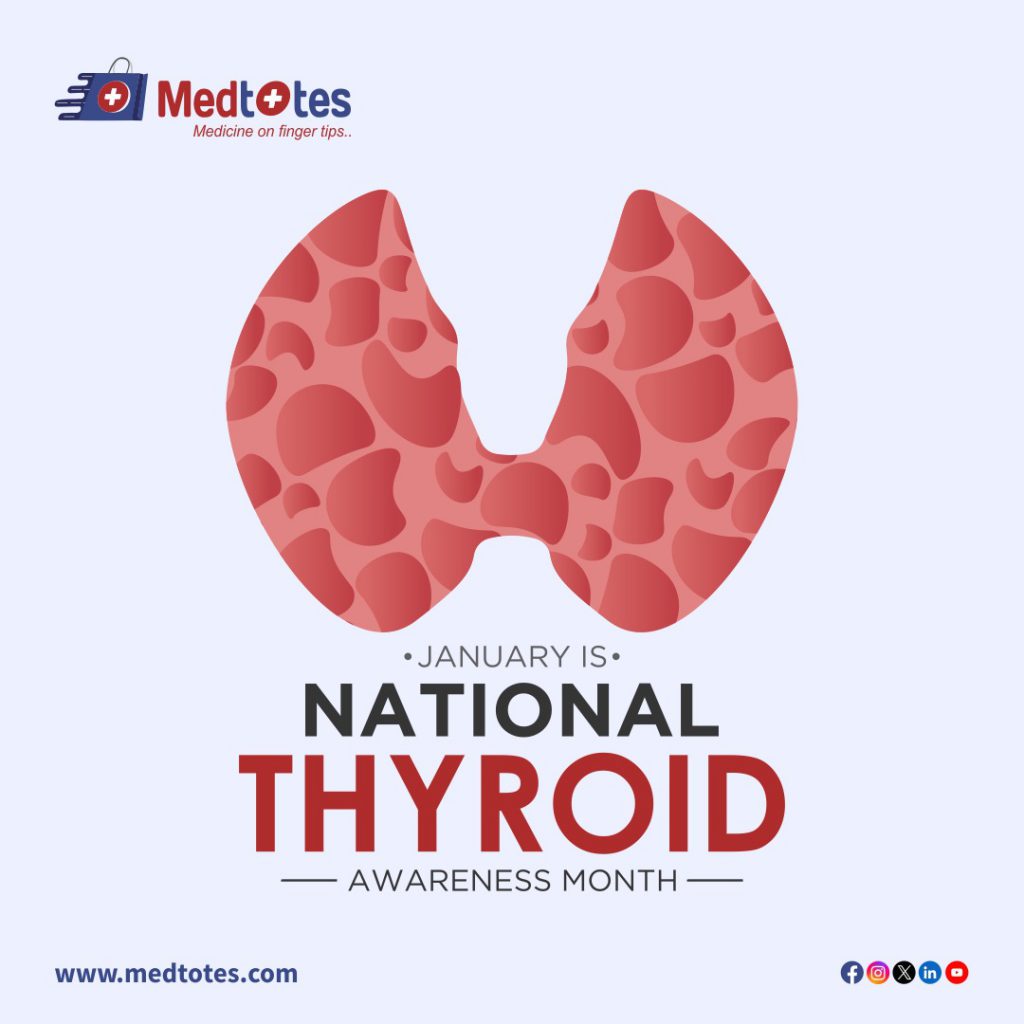I. Introduction
Thyroid Awareness Month, observed in January, aims to raise public awareness about thyroid health, its importance, and the impact of thyroid disorders on overall well-being. This blog post will explore various thyroid disorders, their symptoms, and ways to promote thyroid health, empowering readers to take charge of their health and seek necessary medical attention.

II. Understanding the Thyroid
- Hypothyroidism is a condition where the thyroid gland fails to produce sufficient thyroid hormone, leading to symptoms such as fatigue, weight gain, and depression.
- Hyperthyroidism is a condition where the thyroid gland produces excessive amounts of thyroid hormone, causing symptoms like weight loss, anxiety, and an increased heart rate.
- Thyroid cancer is a malignant tumor originating from the thyroid gland, often causing neck lumps, swelling, voice changes, and swallowing difficulties.
- Understanding thyroid disorders and their symptoms is crucial for early detection and treatment, promoting overall well-being, and preventing potential complications from untreated conditions.
– Symptoms and signs
- Symptoms to monitor include fatigue, weight gain or loss difficulties, depression, hair loss, and sensitivity to cold temperatures.
- Consult a healthcare professional if you experience these symptoms, as early diagnosis and treatment can significantly enhance the chances of successful management and recovery.
- Regular check-ups and screenings are highly recommended, particularly for those with a family history of thyroid disorders.
- Prioritizing thyroid health can enhance life quality and decrease the likelihood of complications linked to untreated thyroid disorders.
III. The Impact of Thyroid Disorders
Thyroid disorders can cause fatigue, weight gain, and difficulty concentrating, leading to serious health complications like heart problems and infertility. Addressing symptoms and seeking medical care is crucial to minimize their negative effects. Treatment options include medications like levothyroxine, surgery to remove a diseased thyroid gland, and a healthy lifestyle with regular exercise and a balanced diet.
- The Importance of Regular Check-ups and Testing
Regular check-ups and thyroid function testing are crucial for individuals with a family history of thyroid disorders. These exams can detect abnormalities early, enabling prompt intervention and treatment. Staying proactive and informed about thyroid health reduces complications and maintains optimal well-being.
- The Role of Stress Management in Thyroid Health
Stress significantly impacts thyroid function, disrupting hormone production and exacerbating thyroid disorder symptoms. To maintain a healthy balance and minimize stress’s negative effects, daily routines should include stress management techniques like meditation, exercise, and relaxation exercises.
- The Importance of Education and Support
Thyroid disorders are complex and challenging to comprehend. Education and support from healthcare professionals, support groups, and online resources can provide valuable information and guidance. By becoming knowledgeable about their condition and connecting with others, individuals can effectively manage their thyroid health and improve their quality of life.
IV. Diagnosing Thyroid Disorders
Diagnosing thyroid disorders typically involves a combination of medical history, physical examination, and laboratory tests. The medical history helps identify any symptoms or risk factors that may be indicative of a thyroid disorder. During the physical examination, the doctor may feel the neck for any abnormalities in the thyroid gland. Laboratory tests, such as blood tests to measure thyroid hormone levels, can provide further confirmation and help determine the specific type of thyroid disorder present. Overall, early and accurate diagnosis is essential for initiating appropriate treatment and preventing further complications.
V. Treatment Options
- Medication: Thyroid disorders can often be managed with medication, such as synthetic thyroid hormone replacement for hypothyroidism or anti-thyroid drugs for hyperthyroidism.
- Radioactive iodine therapy: This treatment involves taking radioactive iodine orally, which is absorbed by the thyroid gland and destroys the overactive cells. It is commonly used for hyperthyroidism.
- Surgery: In some cases, surgery may be necessary to remove part or all of the thyroid gland, especially for conditions like thyroid cancer or large goiters.
- Lifestyle changes: Making certain lifestyle modifications, such as adopting a healthy diet, getting regular exercise, and managing stress, can help improve thyroid function and overall health.
- Regular follow-up: It is important for patients with thyroid disorders to have regular check-ups with their healthcare provider to monitor hormone levels, adjust medication dosages if needed, and address any new symptoms or concerns.
VI. Tips for Maintaining a Healthy Thyroid
- 1. Avoiding exposure to excessive amounts of iodine, as it can disrupt thyroid function.
- 2. Getting enough sleep and practicing good sleep hygiene, as sleep deprivation can affect hormone production.
- 3. Managing stress through relaxation techniques, such as meditation or yoga, as chronic stress can negatively impact thyroid health.
- 4. Consuming a balanced diet that includes foods rich in iodine, selenium, and zinc, which are essential for proper thyroid function.
- 5. Limiting the intake of processed foods and refined sugars, as they can contribute to inflammation and hormonal imbalances.
- 6. Maintaining a healthy weight, as obesity can increase the risk of thyroid dysfunction.
- Overall, adopting a healthy lifestyle and taking proactive measures to support thyroid health can greatly contribute to overall well-being and the prevention of thyroid disorders.
VII. Conclusion
In conclusion, it is important to recognize the potential impact of stress on thyroid health and take steps to manage stress levels effectively. Additionally, prioritizing a balanced diet that includes key nutrients for thyroid function, avoiding processed foods and refined sugars, and maintaining a healthy weight are all crucial for supporting thyroid health. By making these lifestyle choices, individuals can greatly reduce the risk of thyroid disorders and improve their overall well-being.
Download our app: https://bit.ly/3tkQkFy
